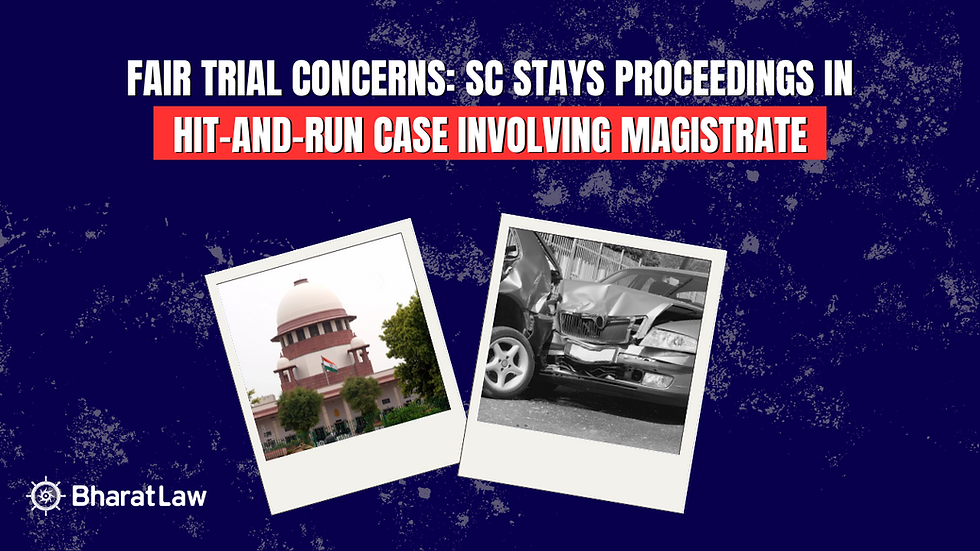Competency Standards Are Crucial for Public Servants: Supreme Court Ruling on Sanction Requirements in PMLA Cases
- Chintan Shah

- Nov 7, 2024
- 4 min read
Summary of the Judgment
Case Name: Directorate of Enforcement vs. Bibhu Prasad Acharya & Ors.
Date of Judgment: 6 November 2024
Bench: Hon'ble Justice Abhay S. Oka, Hon'ble Justice Augustine George Masih
Advocates: Shri S.V. Raju (Additional Solicitor General for India) for the appellant, Mrs Kiran Suri for the respondents
Relevant Acts and Sections: Prevention of Money Laundering Act, 2002 (PMLA) – Sections 3, 4, and 44(1)(b); Code of Criminal Procedure, 1973 – Section 197(1)
Cited Judgments: S.S. Dhanoa v. Municipal Corporation Delhi, Mohd. Hadi Raja v. State of Bihar, Prakash Singh Badal v. State of Punjab, Centre for Public Interest Litigation v. Union of India, P.K. Pradhan v. State of Sikkim
Introduction
The Supreme Court's judgment in Directorate of Enforcement vs. Bibhu Prasad Acharya addresses the intersection of the Prevention of Money Laundering Act (PMLA) with the Code of Criminal Procedure (CrPC), specifically regarding the necessity of prior government sanction for prosecuting public servants. This case highlights significant issues concerning the PMLA’s overriding provisions and the protection offered under Section 197(1) of CrPC for acts committed by public servants while discharging official duties.
Background of the Case
The Directorate of Enforcement filed complaints against Bibhu Prasad Acharya and Adityanath Das under Section 3 of the PMLA for alleged involvement in money laundering activities. The Special Court took cognisance of these complaints, following which the respondents moved the High Court seeking to quash the proceedings. They argued that as public servants, they required prior sanction from the government under Section 197(1) of the CrPC, as the acts were purportedly committed during their official duties. The High Court upheld this contention and quashed the cognisance orders against the respondents, prompting the Directorate of Enforcement to appeal to the Supreme Court.
Key Legal Questions
The case revolved around two primary legal questions:
Applicability of Section 197(1) of CrPC to PMLA Cases: Should prior government sanction be required to prosecute public servants under the PMLA?
Scope of the Protection for Public Servants: Do the alleged acts of money laundering by the respondents relate sufficiently to their official duties to invoke the protection of Section 197(1) of CrPC?
Arguments from the Appellant
Shri S.V. Raju, representing the Enforcement Directorate, argued that the PMLA's provisions take precedence over other laws, including the CrPC, by virtue of Section 71 of the PMLA, which grants it overriding authority. He asserted that applying Section 197(1) of the CrPC would be inconsistent with the objectives of the PMLA, which aims to prosecute money laundering offences without additional procedural barriers.
Additionally, he argued that the first respondent’s position as Vice Chairman of a government corporation did not make him a public servant under CrPC Section 197(1) since he was not irremovable without government sanction.
Respondent's Contentions
Mrs Kiran Suri, counsel for the respondents, argued that both respondents were public servants as defined under Section 197(1) of CrPC. She highlighted that “the power to remove a Director of the Corporation is vested in the State Government,” indicating that the respondents were indeed public servants, protected under Section 197(1). She contended that the alleged acts were performed in the course of their official duties, and the absence of prior government sanction invalidated the proceedings.
The Court’s Reasoning and Findings
Hon'ble Justice Abhay S. Oka and Hon'ble Justice Augustine George Masih delivered the judgment, scrutinising the applicability of Section 197(1) CrPC to proceedings under the PMLA.
Interpretation of Public Servant Protection: The Court recognised that Section 197(1) aims to protect public servants from undue harassment by requiring prior government sanction before they can be prosecuted for acts related to their official duties. The Bench clarified:
“The objective is to ensure that the public servants are not prosecuted for any act done in discharge of official duties, except with prior government sanction.”
This provision safeguards honest officers performing their duties but does not shield misconduct unrelated to official responsibilities.
Application to PMLA: The Bench carefully examined Sections 65 and 71 of the PMLA. Section 65 allows the application of the CrPC to PMLA cases unless inconsistent with the PMLA provisions. Section 71 provides that the PMLA’s provisions will override inconsistent laws. However, the Court noted:
“Section 197(1) of CrPC is not inconsistent with the PMLA and can, therefore, apply to PMLA complaints where the accused is a public servant acting within the scope of their official duty.”
Thus, Section 197(1) of the CrPC was held to apply to the current case, requiring prior sanction.
Determining Scope of Official Duty: The Court evaluated whether the alleged acts of the respondents fell within their official duties. For example, the complaint against Acharya alleged that he allotted land for a project in violation of norms, while Das was accused of unauthorised water allocation. The Court observed:
“The acts alleged against both respondents are linked to the discharge of their official duties, and therefore, they qualify for the protection under Section 197(1) of CrPC.”
The Court emphasised that only acts reasonably connected to official duties, not those that merely use official status as a cover, are protected.
Conclusion
In conclusion, the Directorate of Enforcement vs. Bibhu Prasad Acharya judgment reinforces the principle that public servants cannot be prosecuted for acts connected to their official duties without government sanction, even under the PMLA. This ruling emphasises that while the PMLA has overriding provisions, it does not negate statutory protections like Section 197(1) of CrPC, which ensure fair treatment for public servants.
This judgment not only reinforces the requirement of sanction but also upholds the principle of judicial oversight in cases where competing statutory provisions intersect.



Comments